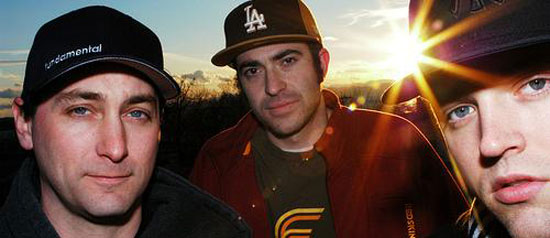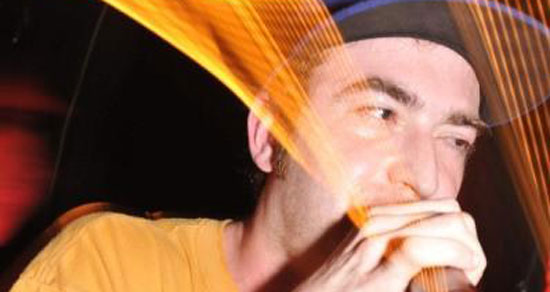The Aztext: DIY Hip Hop Management
Posted by Justin Boland on Oct 28, 2009 | 0 Comments

Doing an interview with The Aztext was doper than usual, because I got to see their operation from three different perspectives. I’m talking in depth with all three members, covering promotion, product, performance, and songwriting. If you’re just getting started, or trying to push your act to the next level, this interview is full of gems on all aspects of managing a hip hop group in 2009.

Pro Talks Process, Product and Promotion
How do you build relationships with local press and radio?
Pro: It takes time. The local press was reluctant to do much for our first album, because to their knowledge, we didn’t have any importance to their reading/listening audience. It wasn’t until we dropped an album and put about 15 shows under our belts, that they began to take notice. Once the relationship is built with the press, whether local or national, it’s a matter of staying in touch semi-regularly, without being obnoxious… which can be tricky.
How many tracks do you recommend recording before narrowing down your final tracklist for an album?
Pro: We are the most unqualified people to answer this question. ‘Haven’t You Heard?’ was written and recorded in 3 months, and all tracks made the album. At that point, Learic and I had been MCing for upwards of 10 years, and just wanted a finalized product to show for those efforts.
We held 4-5 tracks off The Sacred Document. In an ideal world, we will choose from 25 or 30 for the next album, and select 14.
Do you keep backup songs for singles, exclusives, and mixtapes?
Pro: We are sitting on a bunch of international collabos right now, awaiting album’s in France, Romania and Germany to drop. Once the albums come out, we will release those tracks as exclusives. We also have a track with a major label artist that we held back from The Sacred Document, and plan to ‘white label’ sometime soon, around the internet and national radio stations. Not having back up tracks between our first and second album hurt us, because we had nothing to give our listeners between albums. I don’t want us to feel like we need to release a mixtape once a month, but it would be nice to have some heat to deliver every 3 - 6 months, until our next album is done.
What’s the European hip hop market like? Do you have advice for breaking in overseas without buying plane tickets?
Pro: I have never been to Europe. However, from what I understand underground hip hop is alive and well in Europe. If you take the time to surf around myspace, you will notice that European kids have people like Pumpkinhead, Q-Unique, One Be Lo, Sean Price etc. in their top friends. You rarely see ‘major’ American artists like Lil’ Wayne being supported. I think it’s a great market…
As far as ‘breaking in overseas’, if and when we do that, I will be happy to give away our secrets! Until then, we will continue to do tracks with dope European groups that hit us up on myspace and through email.
The Aztext have been getting a lot of radio play far from home-do you have advice on how to build relationships with DJs and get the attention of distant radio stations?
Pro:We worked with a company called Foundation Media on our first album. They supported our record ‘Who’s Wit Us?’ and brought it to number 2 on national college radio charts. We did not have any money budgeted to do the same radio promotion with The Sacred Document, so I literally googled college radio stations, and emailed DJs one by one. The procees became a little monotonous (to say the least), but when DJs started hitting us back saying they dug our record and were planning on, or already had, played it on their show, it became an exciting process… I will say, I don’t think that many (if any) of the DJs would have spun our record if that hadn’t heard of us through Foundation Media one year earlier, that endorsement went a long way.

DJ Big Kat on Preparation and Practice
So many hip hop groups I talk to don’t practice their gigs, and don’t even know how to go about it. What’s the Aztext approach to prepping for shows?
DJ Big Kat: We usually try to get in 3 or 4 full practices before shows. We’ll find a night or two a week we can all get together for a couple hours and get down to business. We’ll usually just get a set list made the first night. We always make a new set depending on the show. For instance, when we opened for Collie Budds we blended some of our tracks onto dancehall beats, or for Lupe Fiasco, we had some new blends on classic hiphop beats.
We try to think ahead to what the crowd will be feeling, and then customize the show to it. As we’re picking songs we’ll be thinking of how there going to transition into each other to keep things moving or allow for breaks to talk to the crowd. We plan on a couple of call and responses, but we’re always ready to improvise, too. After we get the set together, we’ll get back together to practice the show as if it were the performance. We use the tables so we can get the transitions right and time it all so we know if we need to trim or fatten a set.
We’ve had nights we weren’t able to practice, we just put the set together on the way to the venue…and those weren’t our best shows. So we feel we owe it to ourselves, and people coming to see us to be at our best. Now we have 2 albums of material plus blends, and new tracks we’re dying to perform! We’re ready to elevate our live show to a new level.
After years of doing gigs, how has your setup evolved?
DJ Big Kat: The real evolution has been Serato. It’s a luxury to not have to carry 2 to 3 crates of records along with gear to do a gig.
Plus, those records were my personal collection and would occasionally fall victim to spilled beer or who knows what. I put in years watching my vinyl like a hawk at parties. Back then I would have to go through my collection in advance and try to predict what the crowd would be like and pick records to fit, only to have it be exactly opposite of what i thought, and have to deal with what I brought. Now I have my entire music collection on an external hard drive (all backed up on another hard drive) so I can adapt with any crowd and play anything I want!
I love shopping for vinyl, and playing it…but I don’t miss lugging it around!
Looking back, what were the most important steps the Aztext has taken as a group in the past 4 years?
DJ Big Kat: The most important step was probably focusing on having fun and being fam. The more we tried to rush things and get things done the slower we actually went. Now we try to just get together and have a few beers, listen to new tracks and next thing you know the vocal booth’s fired up, pro tools is on and we’re creating.

Learic: Songwriting, Hip Hop, Obsession
Working on your third album, how has your approach to songwriting been changed by your experience with the first two?
Learic: I’d say that I have a much clearer mind of where I want to go with each verse. I feel like on the first album, my eagerness to release a record with Pro and Big Kat, being that it was the first official release for any of us, caused me to not edit my verses as much, sort of a first thought, best thought thing. But I’m a huge fan of Hemingway and Henry James and novelists like that, and they would never have achieved what they did with their prose if they did not go back multiple times to edit, restructure, and revitalize what they’d written.
Obviously a hip-hop 16 is a little different than a novel, but I like to think of each piece of art as being comparable to one another in what they are trying to accomplish, which is connect with other human beings. The first album I let lines slide that I knew weren’t as strong as they could be. That’s the ego getting in a little bit there, a hard thing to check sometimes being that we are all our own biggest supporters, but by the second album I had decided I wanted each verse to be the best representation of my thoughts at the time over that particular instrumental. The second album was about putting together a solid hip-hop album from front to back.
However, for the third album, our approach has changed entirely. We hear a beat now and we discuss at length which direction we would like to take it. This discussion includes the entire group as well. Lots of the hooks as well as other parts of songs are put together with the help of Big Kat. It is an all-inclusive process. This has become more evident on this latest album we are putting together. Each verse I write for this new LP is specifically tailored to that particular track, with no random cliched hackneyed hip-hop references in there.
I am trying to get certain terms out of my rapping vocabulary, like grabbing the mic and flipping, doing this and that to other rappers. Been There Done That. This new record is a completely personal representation of who we are as a group. Not a hip-hop group from Vermont, and whatever image that conjures in the average listener’s mind, but who we are as people in relation to the rest of the world, the music world, and lastly the hip-hop world.
Do you have a personal ritual for writing verses?
Learic: My personal ritual for writing verses is usually sitting with the beat, listening to it extensively, vibing with it, letting it become the general atmosphere of the room, and then as soon as I have my first rhyme scheme picked out for the first line, that usually sets me off. I’m not usually preoccupied with having every rhyme scheme the same in the whole verse, although I respect that talent. I just don’t like to limit myself in that way. There could be something I want to say that doesn’t necessarily rhyme with how I started the verse. De La and Kool Keith made careers out of having unpredictable rhyme schemes, some lines not even rhyming with each other.
However it is fun to test yourself and I had a lot of fun on ‘Lettin You Know’ on the last album, ‘cause me, Pro and One Be Lo all had sixteens that had the rhyme scheme end every line. But the point in this music is to remain unpredictable, as El-P has so clearly shown throughout his career, or Outkast. So when I’m in the world of the verse I am writing, I try to leave all options open. No confinement at all; just a canvas I am choosing to decorate in whichever fashion I choose. However, the criticism of my group members is always welcomed, and that goes for everyone in the group, so that has definitely helped us grow over the years and become on focused group rather than three individual members making music together.
I always keep in mind how I want to end the verse as I am writing it; not the actual line per se, but a general idea of what I want said with that last line. It helps me achieve arc in the last two-thirds of the verse. The editing process is extensive, involving spitting the verse countless times over the beat until all unnecessary words are eliminated so that it can fit the beat perfectly in rhythmic time.
You’ve been crafting monster 16’s for like a decade now-what advice do you have for rappers who are working on their first album or EP of material?
Learic: My advice to rappers planning to release their first album or EP is go over that bitch with a fine-toothed comb until there’s nothing you can find wrong with it. Now, you’ll probably still find things wrong with it after that, but the biggest rookie mistake is rushing a record without that initial review process. You will find yourself listening to the finished product after it’s been released and shaking your head at the things you could’ve changed if you’d only taken the time to give the album a once-over. If you’re going the professional route and getting the album pressed and packaged with cover art and all that jazz, that’s a lot of money to spend without making sure the album’s the best it can be.
Also, don’t feel like you have to overload it with guest appearances. I mean, if you have rappers that you are constantly around and are just a part of your general realm, of course, introduce them to the world through your release, but make sure they are rappers you want to represent you, ‘cause a wack 16 can become a glaring fla’w on your album. Kweli said it best on ‘Manifesto’: “Make sure your crew is as tight as you, ‘cause when they fall off, they’re gonna bring you down, too.” That is the sagest advice someone can give, if you are planning to go at this thing professionally. If you’re just making music for you, who cares, put whoever you want on your album, but if you want it to be something that gets reviewed and considered legitimate by fans and distributors alike, make sure it’s polished and the dopest it can be.
Also, don’t feel like you have to secure some super-16 from an established artist to give your album cred. I can say from experience, yes it is an amazing thing as a fan of hip-hop to have a song with these cats you’ve grown up listening to, and yes it will make fans of that particular artist be like, ‘Whoa, a 16 I haven’t heard from this dude? Huh, who are these guys? Well, I’ll check it out.” And that is all well and good. But what I’ve learned from 5 1/2 years of making albums is that it’s better to just let time and space do their thing. You will meet people you revere and respect throughout your travels if you are on your grind and have your wits about you, and those opportunities will find you if you are ready for them. And then you will have an experience of actually recording with that artist, where you will learn countless things about their writing process, their recording process, and just about them in general. Being in the studio with a true veteran is an invaluable experience.
So my advice is let your music stand for you, and if you happen to meet someone who’s down to build with you and help you get your name out there, by all means follow that path. But don’t feel like you can’t get there by yourself. If you hustle your music to the world via word of mouth, shows, blogs, the internet (myspace, facebook, etc) you can build a solid fanbase that will continue to check out your music.

